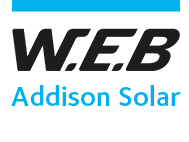FAQ
To help simplify all the information provided on this website, we have provided answers to some of the most frequently asked questions about solar energy and the Addison Solar Project. Learn more below! If you have any additional questions that are not addressed below, please feel free to reach out to us using the contact page.
WEB Renewable Energy USA LLC (WEB USA) is a team of renewable energy professionals who are passionate about community, the environment, and shared social values. WEB USA is a subsidiary of W.E.B, an Austrian, community-owned energy transition company. W.E.B operates a total of 284 wind farms and 53 solar farms at 134 locations throughout Europe and North America. These power plants have a total capacity of 744 megawatts.
WEB USA is proposing a 105 megawatt (MW) AC solar energy project in Steuben County, New York that will consist of solar panel arrays, steel mounting racks, access roads, and electrical equipment connecting the project to the utility’s grid.
In the State of New York, large-scale solar projects, which includes projects with a nameplate capacity of 25MW or more, are required to undergo a state-run permitting process. The permit will be submitted to and reviewed by the Office of Renewable Energy Siting (ORES) which is a state agency that was established under New York State Executive Law Article VIII. The purpose of the ORES is to provide a single forum tasked with reviewing and siting large-scale renewable energy projects. The Addison Solar Project will undergo a rigorous permitting process that considers all pertinent social, economic, and environmental factors.
The project is planned to be built in the Towns of Addison, Campbell and Erwin, New York. See below for a detailed site plan.
Solar renewable energy refers to electricity generated from sunlight. It is a clean, sustainable, and inexhaustible source of energy that reduces dependence on fossil fuels and minimizes environmental impacts. Solar panels contain photovoltaic (PV) cells made of semiconductor materials like silicon. When sunlight hits the panels, it excites electrons in the cells, generating an electric current. This current is converted into usable electricity through an inverter. 1
Yes, all electrical components of solar panels are safely encased in glass. Here at WEB USA, our solar projects incorporate panels that have been certified and tested by reputable organizations such as the Underwriters Laboratories (UL) and the International Electrotechnical Commission (IEC).
Our solar projects are designed and built to rigorous safety standards including fire safety standards in compliance with the Fire Code of New York State, the National Electrical Code (NEC), the International Building Code (IBC), and the International Fire Code (IFC). The Addison Solar Project will be completely enclosed in security fencing so that no part of the system can be accessed by the public. Additionally, training will be available to local first responders regarding access, equipment, preparedness, and response in the case of an unexpected event.
Once construction is complete, the noise generated from a solar project is generally not audible above ambient noise outside of the facility fence. 2 Noise levels during the daytime are negligible and no noise is produced at night.
As part of the permitting process, potential visual impacts and a viewshed analysis will be assessed from locations surrounding the site. WEB USA will elicit feedback from the community and investigate vegetative screening where feasible to mitigate visual impacts.
Solar projects are typically designed to last for 25-30 years with manufacturers usually offering warranties for the first 25 years. Solar panels are tested to withstand high wind speeds and heavy snow loads, and many are specifically tested to ensure they can withstand hail. Proper operations and maintenance can lead to lower degradation and offer longer performance. 3 The Addison Solar Project will create and adhere to an Operations and Maintenance Plan based on industry best practices.
Do you own a local business? We would love to know more about your business. WEB USA uses local labor, contractors, and service providers when possible. Please use the information provided in the CONTACT section of this website to provide information about your company.
The New York State Office of Renewable Energy Siting (ORES) Article VIII permitting process requires extensive surveys and studies to ensure a holistic assessment of the proposed Project. These studies include public health, safety, and security; noise and vibration; visual impacts; effects on cultural and agricultural resources; wetlands, water resources, and aquatic ecology; threatened and endangered species; effects on transportation, communication, and electric systems; geology and terrestrial ecology; socioeconomic effects and environmental justice; adherence to local laws; among others. These studies ensure a thorough and safe vetting of approved Projects.
Part of the permitting process requires a site decommissioning and restoration plan. This plan will address the safety and removal of hazardous conditions, environmental impacts, aesthetics, recycling of materials, potential future uses for the site, funding and a decommissioning schedule. WEB will allocate financial security to ensure the Towns and landowners are not responsible for the decommissioning and removal of the project equipment at the end of the project’s useful life.
The Addison Solar Project will provide significant tax revenues to the Towns of Addison, Campbell, and Erwin, as well as to the local school districts and Steuben County. The Project will also provide opportunities to bid for contracts for work or materials from business owners and residents and is expected to create approximately 450 jobs either directly or through supporting local businesses and economies. WEB USA will partner with local landowners for leases and easements for the project and return the site to agricultural use once the Project reaches the end of its useful life. WEB USA is also committed to forming a Host Community Benefit Program with the Towns of Addison, Campbell, and Erwin, which will provide additional financial support to the local communities during the operation of the Addison Solar Project.
